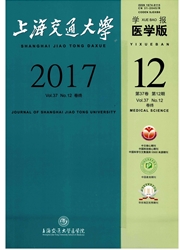

 中文摘要:
中文摘要:
自噬是细胞清除老化元件和受损蛋白的过程,与肿瘤的产生和进展有密切联系。上皮间质转化(EMT)是上皮表型的细胞经过一系列变化获得侵袭和迁移能力,产生间质特性的过程。自噬可能在低氧环境下清除缺氧诱导因子1(HIF-1)进而抑制EMT相关基因转录,抑制TGF-β/Smad信号通路从而抑制EMT,通过选择性自噬适配器p62对泛素化蛋白的作用调节EMT转录因子抑制EMT。对自噬与EMT关系的深入研究有助于找到肿瘤治疗的新靶点。
 英文摘要:
英文摘要:
Autophagy is a self-renewing cellular process by which defective proteins and aged organs are eliminated. It is noteworthy that autophagy correlates with the initiation and progression of cancer. During epithelial-mesenchymal transition (EMT), cells with epithelial phenotype gain mesenchymal characteristics, thus facilitate invasion and metastasis. Autophagy may suppress EMT by the following mechanisms, such as decreasing hypoxia inducible factor-1 (HIF-1) in hypoxia to downregulate transcription of EMT related genes, regulating TGF-13/Smad signaling pathway negatively, utilizing selective autophagy adaptor, p62, to modulate EMT transcription factors. Further studies of the association between autophagy and EMT may contribute to indentify new targets of cancer therapy.
 同期刊论文项目
同期刊论文项目
 同项目期刊论文
同项目期刊论文
 期刊信息
期刊信息
